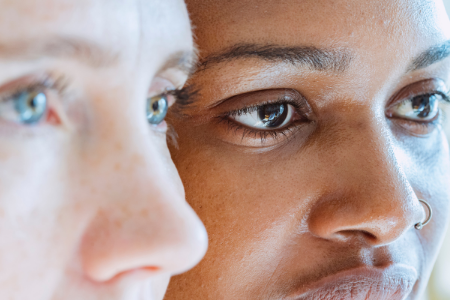 What is dry eye syndrome?
What is dry eye syndrome?- Why would I develop dry eye?
- Do we know the cause of dry eye?
- How is dry eye diagnosed and treated?
- Is there anything I can do to help my dry eye syndrome?
Do your eyes sting and burn? You may have an undiagnosed condition called dry eye. Dry eye is fairly common in adults, particularly as you age, and the prevalence of dry eye appears to be increasing – Google searches for “dry eye syndrome” doubled between 2010 and 2020, so the question remains: How do you treat dry eye?
Is there a way for you to manage the condition yourself? How can you protect the delicate tissues of your eyes, especially as you age? This blog will look at the diagnosis and treatment of dry eye syndrome to help you understand the causes, risk factors, and what you can do to prevent it.
What Is Dry Eye Syndrome?
Dry eye, also known as dry eye syndrome, occurs when the body’s tears don’t adequately lubricate the eyes. You may not realize it, but every time you blink, the eyelids bring a delicate wash of moisture across the eyes. This keeps the sensitive eye structures moist and working properly so you can see.
When tear production or the eyes themselves malfunction, dry eye syndrome can develop. This is an uncomfortable condition. If left untreated, the eyes can be damaged and inflamed.
The symptoms of dry eye include:
- Blurred vision and eye fatigue
- Difficulty driving at night
- Redness
- Sensitivity to light
- Stinging, scratchy eyes
- Stringy mucus around the eyes
- The uncomfortable feeling that there is something in your eyes
- Watery eyes, as the organ tries to overcompensate
If you’re experiencing some or all of these symptoms, it’s possible you could have dry eye syndrome. What could cause this irritating condition and what can you do about it?
Why Would I Develop Dry Eye?
 To develop dry eye syndrome, you either don’t produce enough tears to keep the eye lubricated, or the tears are of a poorer quality so they simply don’t do the job anymore.
To develop dry eye syndrome, you either don’t produce enough tears to keep the eye lubricated, or the tears are of a poorer quality so they simply don’t do the job anymore.
The eye is a delicate, complex structure. For it to work properly, a constant wash of moisture must circulate across the eye, providing nutrients and lubrication to these delicate orbs. Sometimes, though, tear production that keeps your eyes moist simply is out of sync. Dry eye syndrome is the result.
If your eyes don’t produce enough tears, the glands in and around the eyelids could simply not be doing the job anymore. Perhaps the number of tears produced declines, which is a normal part of aging. Or, the tear glands, called the meibomian glands, could be clogged.
Sometimes, dry eye occurs when the tears evaporate too quickly. The tears themselves could be the issue. A tear is made up of:
- Mucus
- Oil
- And water
Each of these components performs a different function to keep your eyes healthy. For example, the oil layer helps prevent the water layer from evaporating too quickly. The mucus layer helps spread the tears across the eye’s surface. If one of these layers fail or the tear volume decreases, dry eye syndrome can develop.
Do We Know the Cause of Dry Eye?
We know the cause of dry eye syndrome, but it varies by person. For example, dry eye can develop:
- As a natural part of the aging process; people over 65 frequently experience dry eye syndrome
- Due to of medications that dry out the eye, such as antidepressants, antihistamines, blood pressure medications, or decongestants
- After staring at the computer screen for long periods
- If you have complicating medical conditions like rheumatoid arthritis, thyroid issues, diabetes, or inflammatory eye conditions
- If you work outside and are exposed to wind or dry climates
- Simply because of your gender; women are more likely to develop dry eye due to hormonal changes
- Resulting from vitamin A or omega-3 fatty acid deficiency
If you allow dry eye to continue over time, the condition can impair vision and damage the surface of your eyes.
How Is Dry Eye Diagnosed and Treated?
There are several fast, painless tests that can help your ophthalmologist diagnose dry eye syndrome:
- A comprehensive eye exam
- A test to measure tear production and the volume of your tears
- Sampling tear tests to look for the telltale signs of dry eye
- Tests to understand tear quality
Having periodic or mild dry eye is something that can be treated with over-the-counter eye drops called artificial tears. However, if the condition is more chronic, the doctor will prescribe treatments depending on what is causing the dry eye syndrome. For example, if medication is causing you to experience dry eyes, there may be an alternative type of drug that doesn’t cause the side effect.
There are also prescription medications that can help, such as:
- Antibiotics to reduce inflammation of the eyelid
- Cholinergic medications to increase tear production
- Corticosteroids to control inflammation of the cornea, or surface of the eye
- Eye inserts (hydroxypropyl cellulose) the size of a grain of rice that you place between the eyeball and the lower eyelid to lubricate the eye
If your dry eye condition doesn’t respond to these types of medications, there are also surgeries available to reduce tear loss or unblock your oil glands. Talk with your doctor about the best treatment for your condition.
 Is There Anything I Can Do to Help My Dry Eye Syndrome?
Is There Anything I Can Do to Help My Dry Eye Syndrome?
There are a few lifestyle changes you can make right now to protect your eyes and take better care of them. For example, you can:
- Add moisture to the air in the winter with a humidifier
- Avoid blowing hot air into your face from the hair dryer, fans, or car heaters
- Pay attention to your environment, for example, if you live in the desert or high altitudes, practice closing your eyes throughout the day to lessen tear evaporation
- Practice eye breaks while you’re on the computer by looking away from the screen, blinking several times, or closing your eyes
- Put your computer screen below eye level, which may help slow the evaporation of your tears between blinking
- Stop smoking and avoid secondhand smoke whenever possible
- Use artificial tear eye drops to keep the eyes moist throughout the day
- Wear wraparound good quality sunglasses when you’re outside even on cloudy days
Your eyes are much more than the “windows to your soul;” they serve a vital function that you rely upon every day to do your job and live your life.
Miami Eye Specialists has a team devoted to the care of your eyes and eyesight. If you haven’t scheduled your annual exam yet, or if you’re experiencing any concerning eye symptoms, please don’t hesitate to contact us.

